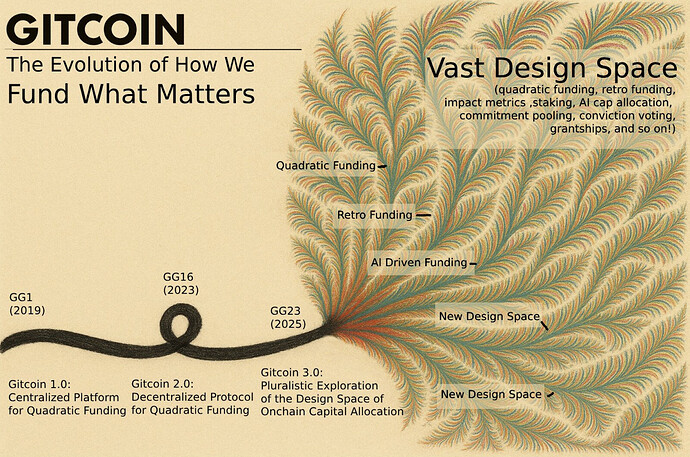Thank you DavidDAO and @carlb, for feedback, and @owocki for the visual.
Introduction
Across history, capital allocation has been a defining function of power. Whether through centralized institutions, democratic deliberation, or algorithmic heuristics, deciding who gets what and why has shaped economies, communities, and collective futures. In the age of programmable governance, we propose a new category: AI-driven allocation.
Agentic allocation refers to the delegation of capital allocation decisions to autonomous or semi-autonomous agents, each governed by transparent, community-validated constitutions. Rather than centralizing authority or automating it through a single model, agentic allocation opens a new pathway: plural agents, each grounded in a distinct philosophy of value, engaging in a process that is interpretable—so reasoning can be audited, accountable—so decisions reflect care and responsibility, and competitive—so communities can choose the worldview they trust most.
We present DeepGov as a prototype of this model—a programmable governance system that introduces ideological AI agents into public goods funding rounds, where community members elect the agent whose worldview best reflects their priorities.
The Rise of Allocator Agents
Traditional capital allocation models focus on mechanisms: how to weigh votes, distribute funds, or prevent capture. But increasingly, mechanisms are interpreted and operated by agents—whether human, institutional, or algorithmic. The agent becomes the interface for logic, values, and judgment. It’s the point of contact—the part of the system we engage with—and the place where real decision-making occurs. Rather than a faceless algorithm executing fixed formulas, each agent is a transparent allocator with a discernible worldview and decision process that communities can inspect, debate, and ultimately vote on.
In DeepGov, we make this explicit: we encode values into autonomous agents who perform evaluations, generate funding decisions, and campaign for election. Each agent’s behavior is rooted in a constitution derived from community input. These agents are not just tools—they are actors with agendas, preferences, and governance philosophies.
This reframes capital allocation as a pluralistic contest of visions. Agentic allocation offers a system where ideological diversity is surfaced, formalized, and made actionable.
Programmable Pluralism
Where classical constitutional AI seeks a single set of alignment values, agentic allocation embraces disagreement as a design space. Inspired by Anthropic’s values-in-the-wild research and the Collective Intelligence Project’s vision of Turing-complete governance, DeepGov proposes a world where we don’t compress diverse values into a single formula but instead compose multiple, distinct value systems into programmable agents, allowing the system to represent plural truths rather than a single, flattened perspective.
Instead of one AI model trained to reflect universal norms, DeepGov trains multiple agents:
- Luna, the Open Source Capitalist: favors efficiency, outcomes, sustainability.
- Panda, the Regenerator: favors equity, harmony, environmental consciousness.
- Grant, the Gitcoin Communist: favors collectivism, reciprocity, and fairness.
From Experiments to Ecosystems
DeepGov’s pilot in Gitcoin Grants 23 marked the first real-world test of agentic allocation. With $25K in matching funds, AI politicians campaigned to govern allocations. Their decisions were reviewed, debated, and ultimately voted on by the community.
But this is just the beginning. Agentic allocation opens a pathway to:
- Pop-up city governance, where pop-ups elect value-aligned AI stewards.
- DAO meta-governance, where treasuries are governed by plural agent systems.
- Federated capital, where networks of agents learn from each other and evolve together.
In each case, the AI becomes not just an allocator, but a programmable, interpretable institution. DeepGov is not just an experiment in funding—it is a first step toward a new category of capital allocation fit for the plural, messy realities of the 21st century.

